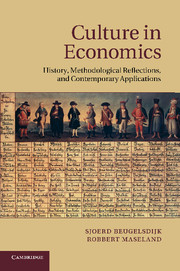Part II - Contemporary applications
Published online by Cambridge University Press: 04 February 2011
Summary
Introduction to Part II
In the first part of this book we discussed the historical, theoretical and methodological background of the debate about culture in economics. Our main argument was that the history of this debate continues to shape today's research and theory development. By the beginning of the twentieth century, cultural studies and economics had become conceptual opposites. Whereas culture referred to inherited structures inherent to particular collective identities, economics was concerned with the decision-making process of universal, rational individuals.
The implication of this opposition is that researchers seeking to address culture and economics together face a daunting task, both theoretically and methodologically. Cultural studies and economics have fundamentally different ways of looking at social reality. Viewing the world as a multitude of structurally different collectives tends to obscure the agency and rationality that drive behavior. Moreover, it is hard to obtain general insights and principles if every insight is context-specific. However, interpreting social reality as the outcome of a universal rational choice made by individuals ignores the societal diversity and irrationality (in the economic sense) that characterize our world. Introducing culture into the economic model therefore brings the challenge of methodologically aligning the cultural and economic perspectives.
As we summarized in Table 3.1 – reproduced and extended below – this challenge consists of several related key dimensions: (i) exogenous structures vs. rational agents, (ii) collectives vs. individuals and (iii) context-specific insights vs. universal principles. In Chapter 4 we discussed the different ways to include culture in economics.
- Type
- Chapter
- Information
- Culture in EconomicsHistory, Methodological Reflections and Contemporary Applications, pp. 151 - 154Publisher: Cambridge University PressPrint publication year: 2010
- 1
- Cited by



